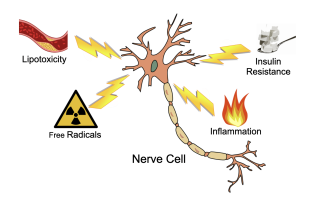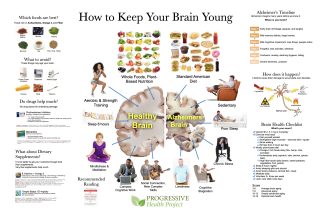The Checklist
If your goal is to maximize brain function and avoid dementia or Alzheimers...
- Take a Vitamin B12 0.1 mg supplement or more/day.
- Exercise most days. This means getting yourself winded!
- Complete exercises that strengthen your thigh muscles like biking and squats.
- Go for a brisk walk.
- Sit less than 4 hours/ day.
- Eat a mostly plant- based diet.
- Eat Omega-3 rich foods daily (flax, hemp, chia, avocado).
- Eat antioxidants daily (spinach, kale, berries, spices, teas).
- Eat high fiber foods daily (beans, sweet potatoes, vegetables, fruit, grains)
- Sleep 8 hours nightly.
- Avoid sleeping pills and alcohol.
- Avoid toxins (tobacco, farmed fish, meat).
- Meditate daily.
- Volunteer 2+ times per week.
- Learn new skills most days.
The Science
The brain is our most active organ. It is just 2% of your body weight, but it uses 20% of your body energy.
The brain is our most active organ. It is just 2% of your body weight, but it uses 20% of your body energy. It is also a sensitive organ. So much so that your body has evolved a “blood brain barrier” to protect the brain from damage from foreign chemicals.
But the human brain was designed (through millions of years of evolution) for a very different environment than we live in. Instead of late night TV, think 12 hours of pitch darkness on the savanna. Instead of bacon double cheeseburgers, think foraging for roots, fruits, tubers, berries, vegetables. The fattiest thing we would have eaten is an occasional nut that we had to pry open, or a fish that we caught. Of the small amount of fat that we consumed, a might higher percentage was health omega 3. The sweetest thing we would eat is about the level of a modern carrot. For our brains to be their best we need to sleep about 8 hours per day and eat a diet rich in fiber and antioxidants, low in harmful fats, low in refined flour, sugar, and industrial contaminants like pesticides, herbicides, and preservatives. To maximize the shelf life of your brain, eat plant-based foods with a short shelf life.
Exercise and movement is central to proper brain functioning. The main signal to grow brain tissue is called Brain Derived Neurotrophic Factor (BDNF). It is mainly only stimulated when we engage in moderate intensity exercise. For our brains to function at their best, we need to exercise. Frequently, several times per day. Less sitting.
Alzheimer’s dementia results from decades of brain-unhealthy lifestyle habits. Over years, we accumulate damage due to the 4 horsemen of brain aging: oxidative damage, inflammation, atherosclerosis (fat and cholesterol buildup in the blood vessels) and insulin resistance (which likely results from fat buildup inside the cells).

The good news: some experts in the field believe that Alzheimer’s disease is 90% preventable and even partially reversible. We can slow the progression of Alzheimers and even reverse its early stages by switching to a brain-healthy lifestyle.
Certain supplements merit special mention: vitamin B12 is of vital importance to the brain. Other B vitamins like folate and thiamine are also important. Some evidence suggests that the combination of a B-complex vitamin plus omega 3 supplement might slow the progression.
Poster for this Checklist
(Click to purchase and download this poster.)

More Information
Print Checkist
Want a daily reminder of how to achieve these goals? Print out the checklist and put it on the fridge or give it to your physician and ask them for their support.
Health Poster
Are you a health care provider that would like to spread the messages of these checklists? Are you working through one of these checklists and would like a larger reminder? Join our health poster of the month club.
Give Feedback
Is this checklist missing something? Do you have a success story from trying this checklist out? We would like to hear any and all feedback.
Support Us
We are a small organization that hopes to help people take control of thier health. Our work would not be possible without your help.
Real Stories
In honor of my dad
My dad passed away of Alzheimer's and seeing him go through that made me want to do anything that I could do to keep my brain young and healthy. I use this checklist every day to remind myself of simple and easy things I can do to achieve my health goals.
Take control of your health, one checklist at a time.
Sign up for our monthly poster club or newsletter.
References
- Jernerén F, Cederholm T, et al. Homocysteine Status Modifies the Treatment Effect of Omega-3 Fatty Acids on Cognition in a Randomized Clinical Trial in Mild to Moderate Alzheimer's Disease: The OmegAD Study. J Alzheimers Dis. 2019;69(1):189-197. doi: 10.3233/JAD-181148.
- Oulhaj A, Jernerén F, Refsum H, Smith AD, de Jager CA. Omega-3 Fatty Acid Status Enhances the Prevention of Cognitive Decline by B Vitamins in Mild Cognitive Impairment. J Alzheimers Dis. 2016;50(2):547-57. doi: 10.3233/JAD-150777.
- Weinmann S, Roll S, Schwarzbach C, Vauth C, Willich SN.Effects of Ginkgo biloba in dementia: systematic review and meta-analysis. BMC Geriatr. 2010;10:14.
- Birks J, Evans JG. Ginkgo biloba for cognitive impairment and dementia. Cochrane Database of Systematic Reviews. 2009;(1):CD003120.


